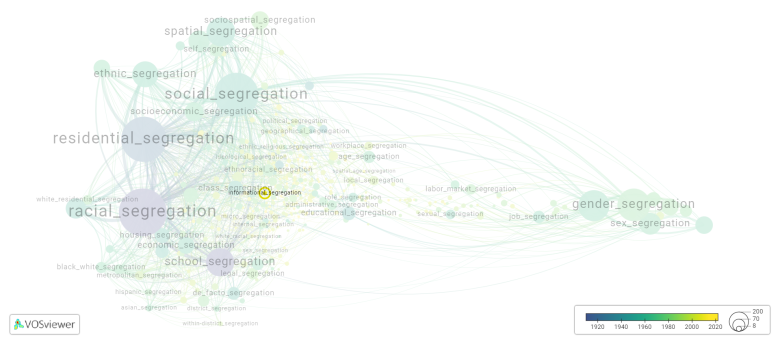Informational segregation: Difference between revisions
(Creating page) |
(Creating page) |
||
| (2 intermediate revisions by the same user not shown) | |||
| Line 10: | Line 10: | ||
Efforts to reduce informational segregation can include promoting diversity and inclusion in the sources of information, ensuring equitable access to information for all individuals, and actively challenging and addressing biases and stereotypes in information dissemination. By breaking down informational segregation, society can move toward a more inclusive and informed community. | Efforts to reduce informational segregation can include promoting diversity and inclusion in the sources of information, ensuring equitable access to information for all individuals, and actively challenging and addressing biases and stereotypes in information dissemination. By breaking down informational segregation, society can move toward a more inclusive and informed community. | ||
===== Synonyms ===== | ===== Synonyms ===== | ||
The following terms are synonymous with: | The following terms are synonymous with informational segregation: | ||
information segregation. | information segregation. | ||
| Line 22: | Line 22: | ||
[[File:informational_segregation.png|780x780px]] | [[File:informational_segregation.png|780x780px]] | ||
This visualization is based on the study [[Segregation_Wiki:About| The Multidisciplinary Landscape of Segregation Research]]. | |||
For the complete network of | For the complete network of interrelated segregation forms, please refer to: | ||
* [https://tinyurl.com/2235lkhw First year of publication] | |||
* [https://tinyurl.com/2d8wg5n3 Louvain clusters] | |||
* [https://tinyurl.com/223udk5r Betweenness centrality] | |||
* [https://tinyurl.com/244d8unz Disciplines in which segregation forms first emerged (Scopus database).] | |||
==References== | ==References== | ||
==Notes== | ==Notes== | ||
Latest revision as of 07:17, 16 October 2024
Date and country of first publication[1][edit | edit source]
2018
United States
Definition[edit | edit source]
Informational segregation refers to the separation or division of information based on certain characteristics, such as race, ethnicity, gender, or socioeconomic status. This can occur in various settings, such as schools, workplaces, media, and society as a whole.
Informational segregation can have negative implications, as it can reinforce stereotypes, limit access to diverse perspectives, and perpetuate inequalities. It can also contribute to the spread of misinformation and the reinforcement of biased narratives.
Efforts to reduce informational segregation can include promoting diversity and inclusion in the sources of information, ensuring equitable access to information for all individuals, and actively challenging and addressing biases and stereotypes in information dissemination. By breaking down informational segregation, society can move toward a more inclusive and informed community.
Synonyms[edit | edit source]
The following terms are synonymous with informational segregation:
information segregation.
References and literature addressing this segregation form under these synonymous terms can be found below.
See also[edit | edit source]
Related segregation forms[edit | edit source]
Informational segregation is frequently discussed in the literature with the following segregation forms:
residential segregation, housing segregation, socioeconomic segregation, income segregation

This visualization is based on the study The Multidisciplinary Landscape of Segregation Research.
For the complete network of interrelated segregation forms, please refer to:
References[edit | edit source]
Notes[edit | edit source]
- ↑ Date and country of first publication as informed by the Scopus database (December 2023).
At its current state, this definition has been generated by a Large Language Model (LLM) so far without review by an independent researcher or a member of the curating team of segregation experts that keep the Segregation Wiki online. While we strive for accuracy, we cannot guarantee its reliability, completeness and timeliness. Please use this content with caution and verify information as needed. Also, feel free to improve on the definition as you see fit, including the use of references and other informational resources. We value your input in enhancing the quality and accuracy of the definitions of segregation forms collectively offered in the Segregation Wiki ©.
Informational segregation appears in the following literature[edit | edit source]
Wadehra S., Mishra A. (2018). Encouraging urban households to segregate the waste they generate: Insights from a field experiment in Delhi, India. Resources, Conservation and Recycling, 134(), 239-247. Elsevier B.V..https://doi.org/10.1016/j.resconrec.2018.03.013
Turetsky K.M., Riddle T.A. (2018). Porous Chambers, Echoes of Valence and Stereotypes: A Network Analysis of Online News Coverage Interconnectedness Following a Nationally Polarizing Race Related Event. Social Psychological and Personality Science, 9(2), 163-175. SAGE Publications Inc..https://doi.org/10.1177/1948550617733519
Boeing G. (202). Online rental housing market representation and the digital reproduction of urban inequality. Environment and Planning A, 52(2), 449-468. SAGE Publications Ltd.https://doi.org/10.1177/0308518X19869678
Ismail M., Warsame A., Wilhelmsson M. (2021). Do segregated housing markets have a spillover effect on housing prices in nearby residential areas?. Journal of European Real Estate Research, 14(2), 169-186. Emerald Group Holdings Ltd..https://doi.org/10.1108/JERER-06-2020-0037
Beni M.D. (2022). A tale of two architectures free energy, its models, and modularity. Consciousness and Cognition, 98(), -. Academic Press Inc..https://doi.org/10.1016/j.concog.2021.103257
